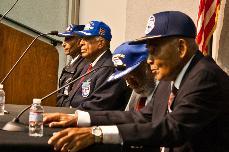Nearly 70 years have passed since the day Oliver Goodall left home to train for the air force, but he remembers the exact words his mother told him as if it were yesterday.”When I left California, my mother told me, ‘Sonny, you’re going down South. Keep your mouth shut and follow orders,'” Goodall recalled.
His mother’s stern advice would prove crucial as Goodall and other African-American men and women headed towards conflict that would test more than just their military training in World War II. Racial tensions and discrimination in their home country would prove just as formidable enemies as the ones the men would face overseas.
On Oct. 16, Goodall and three other Tuskegee servicemen shared their stories in the Vosloh Forum as part of an event showcasing the “Tuskegee: Journey to Flight” exhibit in the Shatford Library.
Located in the African-American Heritage room of the library, the exhibit came about under the direction of history professor Dr. Christopher Jimenez y West. The exhibit had originally been conceived by the California African-American Museum, where West had served as curator before teaching at PCC.
Before and after the 11:30 a.m. panel discussion, Ujima program students led tours of the exhibit for a diverse array of visitors ranging in age and ethnicity, including a group of fifth graders, descendents of Tuskegee airmen, and community members.
While the generation gap could not be greater between the Ujima members today and the Tuskegee Airmen as young men, the tour guides could relate personally to the Airmen’s struggles.
“Regardless of war or not, their contributions transcend time. Even today, African Americans are still not recognized enough in society,” Ujima program member and pre-med major Alan Palmer said.
At the Vosloh Forum, a crowd of 80 visitors gathered to hear four Tuskegee servicemen talk about their experiences as pilots and persons of color. Jimenez y West presided over the discussion as moderator, adding context to the airmen’s descriptions.
At the introduction, President Mark Rocha praised the airmen for their services “at a time when their country did not want to serve them.”
Among the four Tuskegee Airmen present, three had engaged in combat overseas. Also present was author Dr. Robert Rose, who had served as a lieutenant in the Navy and later wrote “Lonely Eagles: The Story of America’s Black Air Force in World War II.”
Each of the Tuskegee servicemen, named so after the base site in Tuskegee, Alabama, eagerly shared his distinct personal history.
While Claude C. Davis appeared less garrulous than his fellow servicemen, he recounted one humorous episode about a training practice gone awry.
He had gone against the instructor’s order to fly below the clouds, and had flown up among them, marveling at the view. “I like it up here,” he thought to himself, but when his instructor checked up on him, Davis realized that he had drifted over a cotton field and had lost his way.
The workers in the field were no more surprised than Davis was when they told him, “You’re in Georgia!” Davis returned to the base an hour late, where everyone thought he had crashed. In response to Davis’s explanation, his instructor dryly said, “They don’t grow cotton in them.”
In front of an audience of all generations, the airmen hoped that they would “keep our history in mind,” according to Goodall.
In a moment of communion, Goodall invited everyone to shake the hand of those nearest him or her, as if carrying on the Tuskegee Airmen’s legacy to each other.

Tuskegee Airmen exhibit in the Shatford Library Saturday, Oct. .16, 2010. The Panel Discussion is a very historic event featuring 3 of the Tuskegee Airmen and an author who wrote about their experiences. (Louis C. Cheung)
- EDITORIAL: Apologize about the real problem - April 23, 2014
- STATEMENT: District apologizes to Oscar winning alum - April 21, 2014
- EDITORIAL: The Forgotten Students - March 26, 2014
